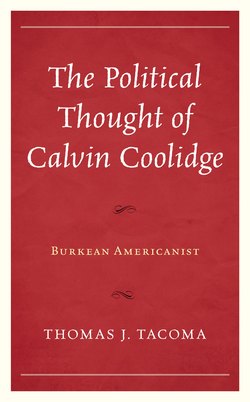The Political Thought of Calvin Coolidge

Реклама. ООО «ЛитРес», ИНН: 7719571260.
Оглавление
Thomas J. Tacoma. The Political Thought of Calvin Coolidge
Acknowledgments
Introduction
Coolidge’s Life
The State of Coolidge Scholarship
Coolidge’s Political Thought
A Note on Methodology
Notes
Coolidge’s Era
The Roots, Principles, and Achievements. of American Progressivism
Pre-Conditions of Progressivism: Economic and Cultural Developments
Philosophic Roots of Progressivism
The Historical School and Historicism
Pragmatism
Social Darwinism
Positivism
The Social Gospel
Principles of Progressive Thought
Principal Progressive Reforms
Conclusion
Notes
The Origins of Coolidge’s. Political Philosophy
Coolidge’s Educational Background
Anson D. Morse: Historian and Proponent. of the Party System. Morse’s Teaching on Civilization and Political Parties
Morse’s Influence on Coolidge
Charles E. Garman: Principal Source of. Coolidge’s Philosophy
Charles Garman: Background
Garman’s Teaching Method and Aims
Garman’s Psychology of Individualism
Garman and Coolidge on Ethics and the State
Garman and Coolidge on Progress and Reform
Conclusion
Notes
The Political Philosophy of. Calvin Coolidge
Civilization and Barbarism
First Measure of Civilization: The Rule of Law. Progress toward Civilization Achieved in the Rule of Law
Religion and the Rule of Law
Education and the Rule of Law
Second Measure of Civilization: Individualism
Primacy of the Individual
Man’s Fixed Nature
Spiritual Aspect of Human Nature
Limits of Human Nature and Political Reform
Third Measure of Civilization: The Law of Service
Fourth Measure of Civilization: Rejection of Expediency
Conclusion
Notes
Calvin Coolidge’s Interpretation of American History
The Progressive Interpretation of the Founding. J. Allen Smith’s Critique of the “Spirit” of the Founding
Charles Beard’s Economic Critique of the Constitution
The Progressive Critique of the Declaration of Independence
Coolidge on America’s Colonial Background
Coolidge and the Value of American History
Coolidge on Colonial America
Coolidge and the Declaration of Independence
Coolidge on Washington and the Founders
Coolidge on the Historical Significance. of the Constitution
Coolidge on Abraham Lincoln
Conclusion
Notes
Coolidge, the American Regime, and Progressivism
Coolidge and Constitutional Basics
Purposes of the Constitution
Constitutional Interpretation: “Hamiltonian Formalism”
Coolidge and the Three Branches of Government
Coolidge and Article I of the Constitution
Coolidge and Article II of the Constitution
Coolidge and Article III of the Constitution
Coolidge on Federalism
Political Parties in a Constitutional Republic
Coolidge’s Critique of Progressivism
The Fundamental Changes Wrought by Progressivism
Direct Democracy
Government Centralization and Administrative Power
Public Administration, Coolidge-Style
Conclusion
Notes
Coolidge’s View of “Constructive Economy”
Coolidge and the Laws of Economics. The Existence of Economic Laws
Economic Individualism and the Right to Private Property
The Justification for Wealth. Property Rights as the Righteous Rewards for Service
Material Wealth Serves Higher Ends
Prosperity Makes Charity Possible
Governmental Economy and the Common Good
How Government Serves the People
Tax Reduction in Service of the People
Challenges of the Modern Economy. Proper Relationship of Government and Business
Constructive Economy and Humanitarian Legislation
Domestic Regulation of the Economy by the Federal Government
The Protective Tariff
Economic Aims of Restrictive Immigration
Coolidge’s Opposition to Unsound Economic Ideas
Problems with McNary-Haugen
Collectivist Theories: Socialism and Communism
Pro-Civilization Economics
The Dangerous Tendency of Popular Governments
Using Prosperity Well
Conclusion
Notes
Calvin Coolidge’s Foreign. Policy Thought
Foreign Policy to Promote Civilization. An End-Point of History?
Peace Requires Justice
The Possibilities of War
Barbarians and Hostility toward the United States
Military Preparedness for the Sake of Peace
Coolidge’s “America First” Foreign Policy. Foundations of American Foreign Policy
The Real Meaning of “America First”
Promoting Civilization Globally
Integrating Sovereignty with International Law
Limiting National Armaments
Membership in the World Court
European Debt Payments
The American Mission: Modeling Righteous Behavior
Between Isolationism and Entangling Alliances
Heirs of American Imperialism
American Interventionism
Outlawing War: Kellogg-Briand
Conclusion
Notes
Conclusion
Coolidge’s Principles
Coolidge the “Constitutional Conservative”?
Coolidge as “Conservative Icon”?
The Meaning of the Great Depression for. American Civilization
Notes
Select Bibliography
Index
About the Author
Отрывок из книги
I once read an acknowledgments page in which the author claimed to have incurred no debts in writing to anyone. I do not pretend to understand how that could ever be true, and it is certainly not true of this book, which could not have been written without the assistance of many good people.
Good books result in large part from good librarians, and I am grateful to the librarians at Mossey Library and at Guyton Library for their assistance. Brenna Wade, Colleen Ladd, Shelby Carmichael, and Hannah Johnson have made my research much easier by helping me to locate books, articles, and old magazine clippings. Special thanks, too, go to Julie Bartlett Nelson, librarian at the Calvin Coolidge Presidential Library and Museum at Forbes Library, who helped me in my archival research.
.....
James, Pragmatism, 54–55. Emphasis in original.
28.
.....